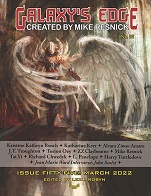 Galaxy’s Edge #55, March/April 2022
Galaxy’s Edge #55, March/April 2022
“The Elephants on Neptune” by Mike Resnick (reprint, not reviewed)
“The Rhinos on Jupiter” by Alvaro Zinos-Amaro
“A Leaf in the Wind” by Katherine Kerr
“With Our Songs of Scars and Starlight” by J.R. Troughton
“Giant Mechs in the Distance, Forever Fighting” by ZZ Claybourne
“Feel” by Torion Oey
“Killer Advice” by Kristine Kathryn Rusch (serial, reprint, not reviewed)
Reviewed by Victoria Silverwolf
This issue features a newly created fictional tribute to a tale by the late founder of the magazine, as well as a quartet of original stories.
“The Rhinos on Jupiter” by Alvaro Zinos-Amaro is a direct sequel to Mike Resnick’s story “The Elephants on Neptune,” which was nominated for both the Hugo and the Nebula. It is highly recommended that readers be familiar with the earlier work for full appreciation of the newer one. Fortunately, it has been reprinted as the magazine’s lead story.
The elephants who became human beings in the previous tale leave Neptune and head for Jupiter, where they encounter rhinoceri. Despite some initial tension between the two groups, they eventually work together to escape the giant planet, where time is slowing down, leading to a new way of life on Neptune.
The author manages to capture the deadpan whimsey of the earlier story, but Mike Resnick’s obvious outrage at humanity’s abuse of elephants gave that work a greater sense of seriousness, under its playful exterior. It takes great courage to create a sequel to a highly regarded work of the imagination, even if it doesn’t quite reach the same level of artistry.
“A Leaf in the Wind” by Katherine Kerr features a government agent who investigates supernatural crimes. She becomes involved in the case of an unscrupulous businessman who was murdered after he illegally removed an ancient tree from property he wished to develop.
Even from this brief synopsis, the reader is likely to be able to predict the nature of the being who slew the man. There is not much more to the story than this revelation. The author has written full novels featuring the same agent, and one presumes they have more fully developed plots.
The narrator of “With Our Songs of Scars and Starlight” by J.R. Troughton is a woman who lives alone on an island. She has the magical ability to control the weather with songs. Years before the story begins, she lost her twin daughters when they attempted to perform a powerful spell on their own. She travels to the far north to find one of her daughters, leading to an unexpected encounter and a deeper understanding of her relationship with her children.
The story contains multiple flashbacks, making the plot a bit hard to follow. The author’s style is poetic and full of vivid images. It will appeal most to readers who favor fine writing and memorable characters over storytelling.
In “Giant Mechs in the Distance, Forever Fighting” by ZZ Claybourne, a man lives alone in a near future of constant warfare, ranging in scale from titanic battles between huge machines to bloody combat between rival street gangs. He makes a simple gesture in order to prevent a local conflict.
This is a deceptively quiet account of a decent person living in a horrible world. The way in which he acts against bloodshed is inspiring, but one has to wonder if it would really work. Whether readers can accept the outcome as plausible may depend on how cynical they are about human nature.
The protagonist of “Feel” by Torion Oey is a teenage girl who suffers a terrible accident, leaving her paralyzed from the neck down and without sensation in most of her body. An experimental technique allows her to experience movement and feelings again, by connecting her mind to a mobile robot body. She also learns that not all feelings are physical.
This is a sentimental, heartwarming tale, obviously meant to touch the reader’s emotions. Most of the story deals with the girl’s joy at being able to spend a day at the beach via the artificial body. The climax is a happy one, and the story as a whole has a sunny mood, despite the protagonist’s plight. Given her age, and the tale’s upbeat tone, it is likely to be best appreciated by young adults.
Victoria Silverwolf reread Mike Resnick’s story in order to write this review, and enjoyed it just as much as the first time.